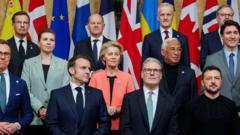Sir Keir Starmer's proposed "coalition of the willing" to secure peace in Ukraine is under scrutiny as the complexities of US support and ongoing military pressure complicate matters.
Challenges Loom Over Starmer's Ambitious Coalition for Ukrainian Peace

Challenges Loom Over Starmer's Ambitious Coalition for Ukrainian Peace
The Prime Minister's alliance of nations faces hurdles as geopolitical dynamics shift rapidly in the wake of a ceasefire agreement.
In recent developments, UK Prime Minister Sir Keir Starmer has intensified efforts to solidify what he terms a "coalition of the willing" during a virtual summit with 29 world leaders. This initiative builds upon discussions from a Lancaster House summit two weeks ago, with the aim of necessitating peace in Ukraine as regional tensions evolve. While he noted a surge in momentum since these conversations began, Starmer has cautioned that there remains substantial groundwork to be laid before this ad hoc alliance can effectively address the intricacies and risks of maintaining peace in Ukraine.
Starmer's remarks signal a growing coalition, although specifics on these "new commitments" remain unclear. The summit participants have reportedly reached a consensus on continuing to provide military support to Ukraine and implementing stricter measures to undermine the Russian economy, aiming to weaken the military capabilities of President Vladimir Putin.
Shifting to the next phase of planning, military leaders are scheduled to convene in the UK next Thursday. Starmer expressed optimism about generating a robust political and military framework, but the path forward is fraught with challenges. The role of US support in any European-led military initiative, often considered a crucial "backstop," is particularly tenuous. Despite ongoing diplomatic negotiations, clarity on the US's stance appears unchanged.
As European national security advisers, including key figures like Jonathan Powell, engage in discussions in Washington, the uncertainty surrounding US military backing casts a shadow on the coalition’s future. Simultaneously, Ukraine faces heightened urgency on the battlefield. Reports indicate that Ukrainian troops in Kursk are under significant stress, despite denials of being surrounded, while Putin's strategy appears aimed at regaining control of strategically important territories.
This precarious situation underscores the contention surrounding notions of a ceasefire, as both Ukrainian forces and Russian leadership engage in increasingly strained negotiations, raising questions about the feasibility and sincerity surrounding peace talks. The stakes are high, and the international community watches keenly as Starmer's coalition navigates through these complex geopolitical waters.




















